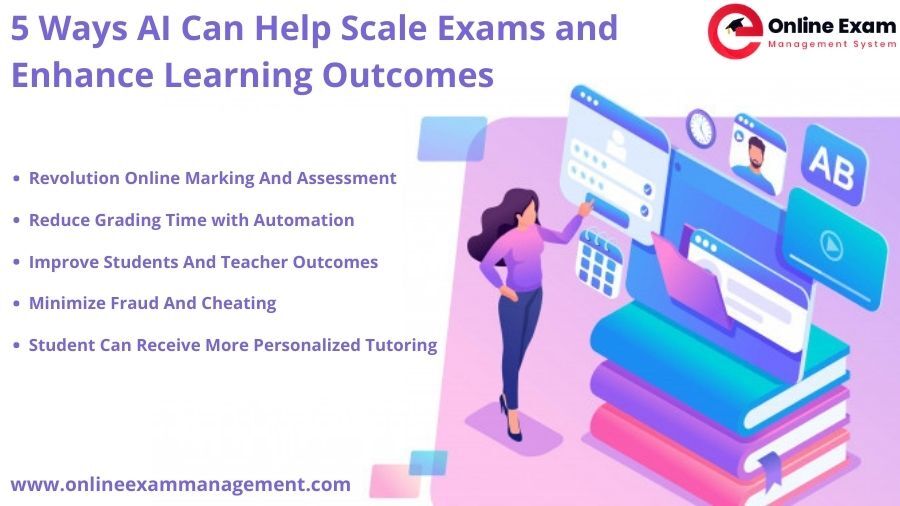
5 Ways AI Can Help Scale Exams and Enhance Learning Outcomes
Artificial Intelligence for education is making the academic world more convenient and personalized. It is changing the way people learn since educational materials are becoming accessible through smart devices and computers.
Today, students don’t have to attend physical classes to review as long as they need computers and an online connection.
AI is additionally allowing the automation of administrative tasks, allowing institutions to attenuate the time required to finish difficult tasks so that educators can spend longer with students.
Now’s the time to debate the transformations brought by AI in education. Artificial Intelligence is now an element of our normal lives.
This AI Technology is everywhere around us from automatic parking systems, smart sensors for taking spectacular photos, and private assistance. Similarly, AI in education is being felt, and therefore traditional methods are changing drastically.
5 Ways AI Can Help Scale Exams and Enhance Learning Outcomes
Given below are a few ways through which AI helps scale exams and enhance learning outcomes:
1. Revolution Online Marking And Assessment
While syllabus and discipline are evolving across educational institutions, assessment processes haven’t transformed enough to satisfy the needs of enormous-scale examinations. This can open the doors to increase the use of online marking and emerging technologies like AI for grading.
As an example, when students take their A-level exams, their handwritten answers are under scanning, and segmenting. These are sent to different examiners for online marking. The result: safe delivery, speed of marking, and real-time tracking of grading and quality assurance. AI is pioneering grading software to boost assessment processes globally.
This software is under the test at the school level. Such AI-based grading software can transcend basic scanning and perform more complex assessments like marking answers to open-ended questions designed to check a student’s cognitive abilities.
2. Reduce Grading Time with Automation
Automated grading can liberate valuable time, significantly reducing the burden of assessors and also slashing the turnaround. It becomes really difficult for the staff to maintain the grading of students without using AI inventions.
This is often especially useful when examiners having higher skills and assessors need bulk supply. AI-based chatbots are making it possible for universities and colleges to conduct real-time tests and surveys at different locations.
3. Improve student and Teacher Outcomes
Programs like Digital India, Startup India, and Make in India – initiated by the govt. of India – are exploring the opportunities for using AI and ML within the education industry.
The development of these technologies is making huge improvements in the outcomes of students and as well as in teachers.
Activities that are difficult to conduct are now run automatically which reduces the extra time on these activities. OLABS funded by the Ministry of Electronics and Knowledge Technology is meant to supply AI teaching assistants and intelligent tutoring systems to students.
These technologies together with living chatbots help improve the loop of student feedback for teachers and graders. Real-time data are often collected in step with students’ profiles and accustomed to make significant changes within the assessment process.
4. Minimize Fraud And Cheating
In conducting high-stakes exams, examination bodies face several challenges like impersonation, use of concealed cameras, and so on. AI can help reduce fraud by taking pictures of students in examination halls and verifying them against scanning documents.
Plagiarism detectors can help detect copying. While webcams help monitor multiple exam locations for malpractice. AI-based algorithms can validate even keystroke signatures by evaluating keyboard pressure and speed. Not only that.
They’ll also create different question papers for various locations by randomly assigning questions or changing numerical variables in subjects like maths or finance to discourage stealing or advance circulation of question papers.
In the traditional manner of conducting exams, there is a chance of cheating at higher rates. This is because there is no accountability of students for cheating. As there is no proof of who is exactly having activities in cheating.
5. Tutoring After Introducing AI
Students Can Receive More Personalized Tutoring After introducing AI, teachers aren’t necessarily replaced, but they’re in a very position to perform far better by offering personalized recommendations to every pupil.
AI customizes in-class assignments also as final exams, ensuring that students get the simplest possible assistance. Research indicates that instant feedback is one in every one of the keys to successful tutoring. Teachers can condense lessons into smart study guides and flashcards.
they will also teach students counting on the challenges they face in studying class materials. Unlike in the past, college students can now access a bigger window of time for interacting with professors.
Due to AI, smart tutoring systems, like Carnegie Learning, offer quick feedback and work directly with students. Although these methods are still in their inception stages, they’ll soon become fully-fledged digital teachers to help students with any educational needs.

